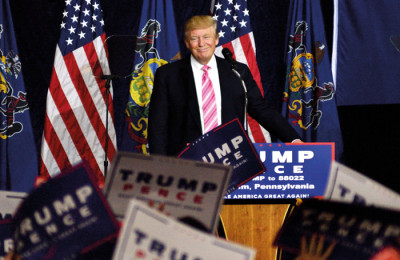
David Worsfold
At the turn of the year, many feared the worse when surveying the crowded landscape of geo-political hazards dotted across 2017. With the ramifications of Brexit and Trump still being absorbed into corporate planning and investment strategies, there was a very tangible sense that the crisis might have only just begun.
As we approach the halfway point in 2017, those fears might now seem over-stated.
Populism – and the anti-globalisation agenda it largely embraces – has not triumphed in a succession of key elections in Austria, Holland and France. Add to that largely positive picture the news that Syriza, the governing party in Greece, is close to securing Parliamentary support for the fiscal and economic reforms demanded by its creditors as a pre-condition for further debt relief, then Europe, at least, seems to be in a better place. This gives everyone, including insurance company CIOs, some welcome room for manoeuvre.
It also means they can focus more clearly on the consequences of 2016’s two key shocks. These have by no means played out fully.
Looking across the Atlantic, Donald Trump continues to do the unexpected, creating instability and uncertainty in his wake. His brutal dismissal of FBI director James Comey reminds us of his unorthodox approach to the Presidency and how he continues to behave as if he was running a private business along rather old-fashioned lines.
Many investors will put this controversy to one side and focus instead on his promises of sweeping reductions in personal and corporate taxes and major infrastructure investment programmes. These factors are already helping boost the value of a wide range of US equities and will most likely continue to do so.
However, a degree of caution needs to be retained in case Trump’s penchant for settling old grudges reaches into the financial sector – specifically the Federal Reserve. He has previously made little secret of his dislike of Janet Yellen, criticising her on several occasions for pursuing a low interest rate policy at the behest of President Obama in order to help Hillary Clinton’s campaign.
There were fears that too rapid a rise in US interest rates might see Trump try to dismiss Yellen before her term is up in February next year. In an interview last month, the Wall Street Journal (subscriber-only content) asked Trump if it was safe to assume Yellen was "toast" when her term as Fed chair is up. He responded more positively than some might have expected: "No, not toast," Trump said. "You know, I like her, I respect her. She's been here [in the Oval Office.] She's been in that seat. I do like the low interest rate policy."
This softening in approach suggests that she might not be under any immediate threat, although the caveat about not pushing interest rates up too far, too fast is clearly there. It does still seem very likely that Trump will want to put his own man (almost certainly a man) in place next year. Investment managers need to build that prospect into their medium-term strategies.
Here in the UK, it will be Brexit that exerts the biggest disruptive influence over economic performance and investment returns.
The fears of a brutal exit on the back of failed negotiations have certainly risen since the outburst of megaphone diplomacy between Prime Minister Theresa May and European Commission President Jean-Claude Juncker. These fears have been further exacerbated as the campaigning in the UK’s surprise General Election becomes ever more strident.
City firms have privately been discouraged by their dealings with the Brexit and International Trade departments which they feel simply do not understand the complexity of the UK’s financial services sector and its relationships with Europe. Most have taken comfort in the supportive noises coming from the Treasury and the Chancellor of the Exchequer, Philip Hammond. This could be coming to an end.
Since the Budget and the embarrassing climbdown over National Insurance increases for the self-employed, Hammond’s star has been on the wane. As the election campaign has gathered momentum, the briefing against him by some of May’s advisers has grown more confident, openly accusing him of trying to block some of the Prime Minister’s policy initiatives such as the cap on energy prices. This does not bode well for the post-election reshuffle.
Even if Hammond survives, he could find his team re-populated with Brexit hardliners and his influence in the negotiations greatly reduced.
The unpredictable consequences of 2016’s geo-political shocks will be with us for a long time to come.
